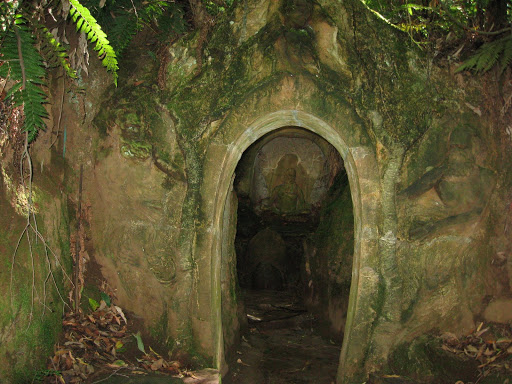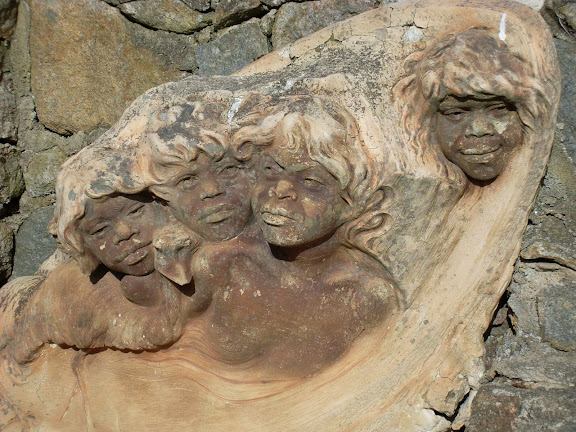Situated in the Dandenongs in a ferny glade, the William Ricketts Sanctuary is a place of beauty and tranquility, due to the natural setting and the mystical sculptures half hidden among ferns along enchanting pathways.

Made of clay from the Bendigo region, these breathtakingly beautiful and visionary sculptures create a magical presence. Ricketts wanted to express his respect for Aboriginal culture and foster a love of the Australian landscape with visitors via his artworks.
The sculptures encourage an exploration of the gardens whilst reminding all of the important mission in his work and promoting a respect for the land.
Visitors must pass by this pair (below), welcoming them and reminding them that respect of environment is fundamental.
Most of Ricketts’ clay works are of Aboriginal people – particularly their faces and hands – intertwined with vegetation and small Australian marsupials such as possums and kangaroos.
Through his artworks, he constantly reminds us of the special relationship that the Aborigines had to the landscape prior to White Settlement and the destruction that was wrought upon them.
He even expressed his activism by using his own face on the figure on the left in the image below.
The works are made of kiln-fired clay and in many cases have been attached to large boulders or stones located on-site. In fact, if you look closely you can see crack in the sculptures , and especially in the image above.
Over time, the moist and cool environment has allowed the sculptures to weather, thus facilitating their integration within the surrounding bush
The power of his vision of Aboriginal spirituality and respect for the natural world has assured his place in history as a unique artist.
Photographic records of his sculptures, particularly those from the sanctuaries of Pitchi Ritchi and Mount Dandenong which have been vandalized, are held in the archives of Australia's libraries.
Word soon spread about the extraordinary sculptures that adorned the Sanctuary and in the 1960’s the State Government of Victoria purchased the land and adjoining blocks for the purposes of creating a public reserve. Ricketts continued to live and work on the property until his death in 1993.

William supported himself through commissioned sales of his art and often created pieces as gifts. These signed original small pieces are increasingly sought after for private collections.
From 1949–1960 he made frequent trips into Central Australia to live with Pitjantjatjara and Arrernte Aboriginal people whose traditions and culture inspired his sculptures.
Many of his central Australian works are located at Pitchi Ritchi, near Alice Springs. a bird sanctuary run by his friend Leo Corbet. He considered the landscape an integral part of his sculptures.
In 1934 he started his major artistic work - creating the sculpture park now named William Ricketts Sanctuary. He worked on this project until his death in 1993.
There is a message in Ricketts’ work – to respect the Aboriginal people and their culture. But most importantly, to love and cherish the Australian landscape.
He believed that we – the people, the trees, the animals – were all one enormous organism created by God. And therefore we should express our love of God by caring for each other and our landscape. For Ricketts there was an obvious harmony between our Christian faith and the traditional beliefs of the Aborigines.
He spent two years in India, mostly at the Sri Aurobindo Ashram spiritual center in Pondicherry, developing spiritual empathy with Indian people and knowledge of their philosophy.
Ricketts not only argued that Australia’s progress depends on the preservation of its wild environments, but he saw himself as a defender of the aboriginal people. He believed he was enlightened and therefore had to lead the rest of Australian society down the same philosophical path.
His major works include the "Dromana" in the Seawinds Garden, Arthurs Seat, Victoria, and "Gun Brute", William Ricketts Sanctuary, Mount Dandenong, Victoria.
Sadly, the sanctuary was ravaged by fire, however, a number of the sculptures, although charred, still remain. Fortunately, the damage was not extensive and the sanctuary is still open for daily tours.
Restoration efforts to clean and repair them are underway and the foliage around them has already begun to spring forth once more.
When walking along those paths, it is easy to miss some of the smaller sculptures that might be partially hidden!
The sculptures below look as though it bears the scars of a fire.


More Images Of These Enchanting Sculptures

Many smaller works are in the collection of the Powerhouse Museum, Sydney.
For more about this magical place, check out
Aboriginal People Sculpture
From The William Ricketts Sanctuary
Although it is a bit grainy in spots, this video is amazing! It also features interview clips with Mr. Ricketts!




0 comments:
Post a Comment